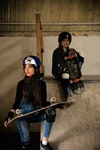Oliver Percovich moved to Afghanistan in 2007, hot on the heels of his then girlfriend who had accepted a job in Kabul. It wasn’t long before
As he explored Kabul, Percovich became a sort of Christopher Columbus in reverse. Instead of discovering an unknown country, it was he who introduced the locals to something they had never seen before. Initially just as an entertaining and supportive pastime, he started arranging meet-ups where he’d teach the basics of skateboarding to kids who sold chewing gum and knick-knacks to passers-by, cleaned cars at road junctions for a few cents, or got up to no good loitering on the streets from morning to evening. He gave them a passion, but also the perseverance to nurture it. He showed them how to push off with their back foot, dodge the rubble, ollie over cracks in the asphalt, carve turns in the circular basin of an empty fountain, and skirt around the majestic ruins of bombed-out buildings. There was a mutual understanding that had no need for words.
Ramped Up: Skateistan programs aim to help children explore their interests and shape their own futures. Above, a 17 year-old and 14 year-old student. For security reasons Skateistan requested that its students not be identified by their real names. Girls make up 50% of Skateistan’s students. This is significant in a country where girls are more likely to be out of school and are often excluded from sport and physical activity of any kind.
© Kiana Hayeri
“Young people from different ethnic groups and all kinds of social backgrounds would turn up at the gatherings. A few were rich, but many others were very poor. A different identity began to take shape among them. They were no longer Tajik or Hazara – they were skateboarders.”
The skating spirit also cut across genders. “Girls came along too. I’d noticed they never played any kind of sport, but skating was allowed by their parents and tolerated by strangers because it didn’t fit any known category. The rules couldn’t forbid something that was uncharted by social norms. Even with time, people looking at it from the outside continued to misunderstand it.” They let girls skate because they saw skateboards as a kind of exotic toy. It was a form of escape not forbidden to women, saved by its newness and then its ostensible innocence.
Skateistan has skate schools in Kabul and Mazar-e-Sharif and is building its third Afghan skate school in Bamyan. Above: a group of 11-14 year-old students take a break from skating.
© Kiana Hayeri
Meanwhile, the chemist graduate started working on a formula of his own based on empirical observation. “About half of Afghanistan’s population is under 15 and lives in a crumbling country that’s just a shadow of its former self. If these kids are educated and given proper guidance, they can trigger positive change and inject tremendous energy into getting their nation back on its feet.” It’s a possible task for the next generation, but it still seems like a utopian dream for the present one, “which has grown up in the fury of civil war, shorn of hope and merely longing to escape”. Percovich also faced some major structural challenges in putting his theory into practice. “The educational system was obsolete and cursory. It involved learning things by heart and wearily repeating whatever the teacher said.” A different kind of schooling was needed to unlock the potential of Afghanistan’s societal framework.
(Continues)
Opening image: a 7 year-old student.

